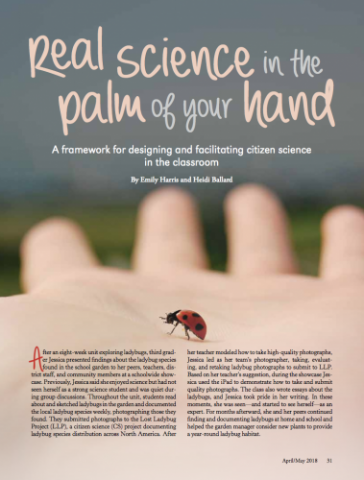A framework for designing and facilitating citizen science in the classroom
Real Science in the Palm of Your Hand: A framework for designing and facilitating citizen science in the classroom
A new paper by recently graduated Emily Harris and the Center’s Faculty Director, Heidi Ballard, provides a framework for educators to design and implement citizen science projects in the classroom to facilitate meaningful student learning. This publication adds an important component to our suite of materials aimed at helping educators use Youth-focused Community and Citizen Science in their work. Harris and Ballard introduce Jessica, a third grader who contributed ladybug data to the Lost Ladybug Project as part of an in class citizen science activity. They identify the factors that made this particular project meaningful, and outline in detail how to design future citizen science project to yield similar outcomes.
Drawing on findings from our YCCS research, Harris and Ballard highlight four types of core citizen science activities that can promote environmental science agency: activities that develop expertise and interest, collect and upload data, make meaning about that data, and share the work beyond the classroom. The researchers emphasize that these activities must also be met with key youth practices and key educator practices in order to contribute to significant student learning. To contribute to impactful learning, citizen science projects should ensure students take ownership of the data quality, share their findings with broad audiences, and think about complex social-ecological systems. These practices can contribute to student development of environmental science agency when supported by educators who position students as scientists, frame the work in local and global contexts, and prepare for unexpected results.
File:
Attachment









